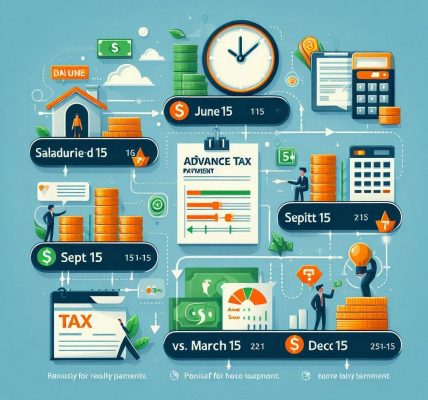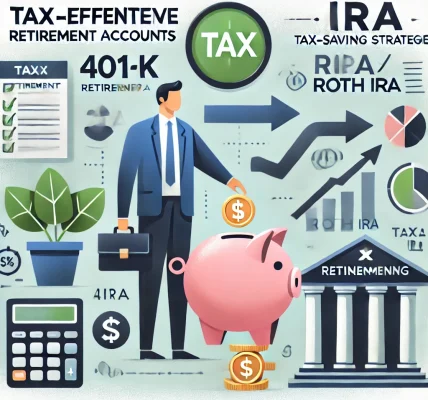Introduction
Starting your first job is exciting, but understanding how taxes work can be overwhelming. If you’re a first-time salaried employee, knowing how to save taxes effectively can help you maximize your take-home income. This guide will walk you through essential tax-saving tips, deductions, and investment options to reduce your tax liability legally.
1. Understanding Your Salary Structure
Your salary is divided into different components, some of which are taxable while others are exempt. Here are key salary components to focus on:
- Basic Salary: Fully taxable
- House Rent Allowance (HRA): Partially exempt under Section 10(13A)
- Conveyance Allowance: Tax-free up to Rs. 1,600 per month
- Medical Allowance: Tax-exempt if used for medical expenses (up to Rs. 15,000 per year)
- Special Allowance: Fully taxable
- Provident Fund (PF): Employee contributions are eligible for tax deduction under Section 80C
2. Maximizing Section 80C Deductions (Up to Rs. 1.5 Lakh)
Section 80C offers multiple investment options that help reduce taxable income. Some of the most effective tax-saving investments include:
- Employee Provident Fund (EPF): Employer’s contribution is tax-free, and your contribution is tax-deductible under 80C.
- Public Provident Fund (PPF): Tax-free returns and a great long-term investment.
- Equity-Linked Savings Scheme (ELSS): Provides tax benefits and higher returns with a 3-year lock-in.
- National Savings Certificate (NSC): Secure investment with tax benefits.
- Tax-Saving Fixed Deposits: 5-year lock-in with interest being taxable.
- Life Insurance Premiums: Premiums for self, spouse, and children are deductible.
- Tuition Fees for Children: Fees paid for up to two children are eligible for deduction.
3. Claiming House Rent Allowance (HRA) Exemption
If you are a salaried employee living in a rented house, you can claim HRA exemption. The exemption amount is the least of:
- Actual HRA received
- 50% of salary (metro cities) / 40% of salary (non-metro cities)
- Rent paid minus 10% of salary
Note: If you do not receive HRA but pay rent, you can claim a deduction under Section 80GG.
4. Tax Deductions Under Section 80D (Health Insurance)
- Deduction of up to Rs. 25,000 on health insurance premiums for self, spouse, and children.
- Additional deduction of Rs. 50,000 for parents above 60 years.
5. Save Tax on Loan Repayments (Section 80E & 24(b))
- Education Loan: Interest paid is fully deductible under Section 80E (no upper limit).
- Home Loan:
- Principal repayment qualifies for Section 80C deduction.
- Interest payment up to Rs. 2 lakh is deductible under Section 24(b).
6. Additional Tax-Saving Sections
- 80TTA: Deduction of up to Rs. 10,000 on interest earned from savings accounts.
- 80G: Donations to registered charities are eligible for tax deductions.
- 80CCD(1B): Additional Rs. 50,000 deduction for NPS investments.
7. Choosing the Right Tax Regime
The government offers two tax regimes:
- Old Regime: Allows deductions (80C, 80D, HRA, etc.) but has higher tax slabs.
- New Regime: Lower tax rates but no deductions.
| Income Slab | Old Regime (with deductions) | New Regime (without deductions) |
|---|---|---|
| Up to 2.5L | No Tax | No Tax |
| 2.5L – 5L | 5% | 5% |
| 5L – 7.5L | 20% | 10% |
| 7.5L – 10L | 20% | 15% |
| 10L – 12.5L | 30% | 20% |
| 12.5L – 15L | 30% | 25% |
| Above 15L | 30% | 30% |
Before selecting a regime, compare your taxable income under both and choose the one with lower liability.
8. Filing Income Tax Returns (ITR) on Time
- Salaried employees with income below Rs. 50 lakh should file ITR-1.
- File returns before July 31st to avoid penalties.
- Use Form 16 provided by your employer for filing ITR easily.
9. Common Tax Mistakes to Avoid
- Not investing in tax-saving instruments early in the year.
- Ignoring additional deductions under 80D, 80TTA, and 80E.
- Not opting for HRA exemptions.
- Failing to file tax returns on time, leading to penalties.
Conclusion
As a first-time salaried employee, understanding tax-saving strategies can significantly impact your financial health. By utilizing deductions under 80C, 80D, HRA, and home loan benefits, and choosing the right tax regime, you can reduce your tax liability and increase your savings. Start planning your taxes early and seek professional advice if needed to ensure compliance and optimize tax benefits.
Key Takeaways: ✔ Use 80C deductions to save up to Rs. 1.5 lakh. ✔ Claim HRA exemption if you live in a rented house. ✔ Utilize deductions on insurance, home loans, and education loans. ✔ Choose between old and new tax regimes wisely. ✔ File your ITR on time to avoid penalties.




